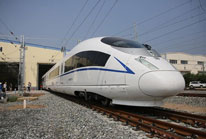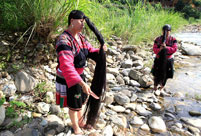

Before my arrival in China late February of this year for the China Africa media fellowship, little did I know about the country’s political system, despite hearing and reading about her. What I had heard was: “There is no democracy in China because it is a one-party state.”
I held this opinion, not because I believed it, but because I was not really interested in knowing about China’s politics. However, because the call of duty brought me here I have come to know better after covering China’s most prominent political event.
Politics-As the Africa-China Relations initiative becomes more prominent and captures more world’s attention, the question that lingers is, what lessons African leaders and even the citizens themselves can learn from the fast economic growth and development of China. With its population of 1.37 billion, covering a land area of 9.6 million square km, China has unique political collaboration and consultations that drive her success.
Local and international journalists
China is ruled by a one-party system, the Communist Party of China (CPC); but unique coordination and consultations are the hallmark of the leadership in steering the affairs of the country, as every player, even the other parties, one way or the other, demonstrates nationalism.
That is the take-away I got from covering the sessions on how political leadership of a country could be amicably handled and managed to reduce tension and allow for more progress and development. That system is just unique to China and no matter what other countries say about it and how they misunderstand them, they stick to it and have used it to further the country to its powerful position today.
The 22 African journalists on 10-month fellowship at the China Africa Press Center (CAPC) had arrived few days to the opening of the country’s annual political sessions: The National People's Congress (NPC) and the Chinese People’s Political Consultation Conference (CPPCC) in early March.
African journalists in frong of the Great Hall after covering one of the sessions
Under the supervision of our host, the CAPC, we were accredited to cover the two events that caught the attention of the world, as evidenced by the largest media coverage in my career so far. Local and foreign journalists at the events were estimated at about 3,500.
Inside the chambers, a newcomer would wonder how such a big country with large population and diverse cultures is governed by one party over the years without wrangling or political crisis. It could have been expected also that like the typical legislature, there would naturally be dissenting views following the opening sessions, hot and disagreements arguments judging from the polity I know; but members of the Two Sessions conducted the events cordially.
It was a great experience on March 3, when the chairman of the Standing Committee of the CPPCC National Committee, Mr. Yu Zhengsheng delivered report on the 2015 work of the Committee at its Fourth Session opening ceremony.
CPPCC is a political advisory body in China. It consists of delegates from a range of political parties and organizations, as well as independent members. The proportion of representation of the various parties is determined by established convention, negotiated between the parties.
The dominant party in the Conference is the Communist Party of China which has about one third of the seats. Other members are drawn from the United Front parties allied with the CPC, and from independent members who are not members of any party. The Conference is intended to appear to be more representative and is composed of a broader range of people than is typical of government office in the country.
CPPCC, according to the People’s Daily, is a patriotic united front organization led by the Communist Party of China (CPC). It is made of deputies from the CPC, eight non-CPC parties, non-party democrats and people's organizations, deputies from various minority nationalities and from all walks of life, and Taiwan, Hong Kong and Macao compatriots and returned overseas Chinese, as well as specially invited people.
Deputies outside of the Great Hall of the People
 |
 World's fastest bullet train to start operating next month
World's fastest bullet train to start operating next month Huangluo: China's 'long hair village'
Huangluo: China's 'long hair village' Spectacular bridge with one of the tallest piers in the world
Spectacular bridge with one of the tallest piers in the world Magnificent view of Hukou Waterfall
Magnificent view of Hukou Waterfall A glimpse of Stride 2016 Zhurihe B military drill
A glimpse of Stride 2016 Zhurihe B military drill US Navy chief tours Liaoning aircraft carrier
US Navy chief tours Liaoning aircraft carrier Chinese American woman wins Miss Michigan
Chinese American woman wins Miss Michigan Centenarian couple takes first wedding photos
Centenarian couple takes first wedding photos Traditional Tibetan costumes presented during fashion show
Traditional Tibetan costumes presented during fashion show Top 10 livable Chinese cities
Top 10 livable Chinese cities Top 20 hottest women in the world in 2014
Top 20 hottest women in the world in 2014 Top 10 hardest languages to learn
Top 10 hardest languages to learn China’s Top 10 Unique Bridges, Highways and Roads
China’s Top 10 Unique Bridges, Highways and Roads Chinese athletes switch nationality for opportunities, welfare
Chinese athletes switch nationality for opportunities, welfare With another Olympic gold, Lang Ping rekindles national pride
With another Olympic gold, Lang Ping rekindles national pride Who holds the purse strings?
Who holds the purse strings? Chinese author Hao Jingfang wins Hugo Award for Best Novelette with ‘Folding Beijing’
Chinese author Hao Jingfang wins Hugo Award for Best Novelette with ‘Folding Beijing’Day|Week